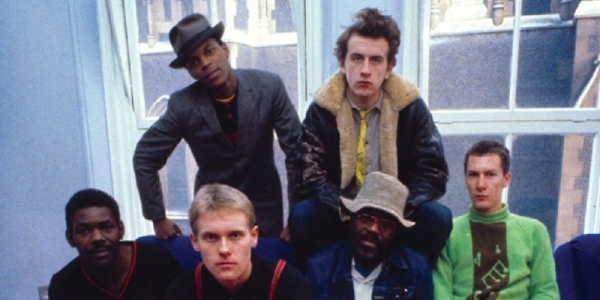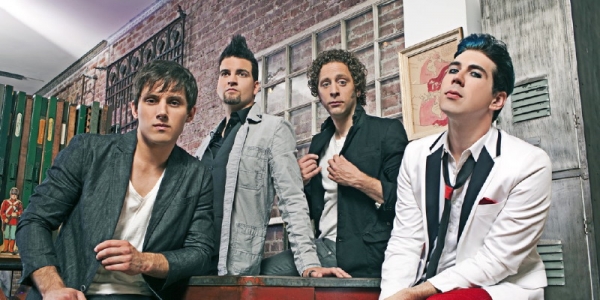Wakeling was born and bred in the industrial city of Birmingham in the north of England. Once a thriving hub of manufacturing, Birmingham was hit hard by the decline in the English economy in the 1970s; in the 1980s, Birmingham bore the brunt of Margaret Thatcher’s draconian economic policies. Wakeling has fond memories of the community in which he grew up; his recollections of the Birmingham climate are not so positive. “The people in Birmingham were always big hearted people,” Wakeling says, his deep Birmingham accent still obvious despite the years spent living across the Atlantic. “And there was a great sense of humour, albeit a gallows humour.”
The wave of post-war immigration, especially from England’s colonies in the Caribbean, into Birmingham meant that Wakeling’s social group was integrated well beyond London. Perhaps surprisingly, Wakeling suggests the decline in Birmingham’s economic fortunes laid the sociological foundation for the English Beat’s racial mix. “I think it was fortunate that the industrialisation in the city and the collapse of industry meant that people had been forced together,” Wakeling says. “So you had black, white and Asians working together. We didn’t realise how different that was until we played our first gig in London.”
In the early 1970s ska music, the Caribbean musical style brought to England with the wave of post-war migration, was already developing a broad following. “Ska was already around quite a lot in the early to mid 1970s because in the soccer they used to play ska before the games, and after, so they could keep the skinheads quiet,” Wakeling says. “So I grew up with ska as part of our football experience, rather than as a musical movement.”
By 1978 Wakeling had teamed up with Ranking Roger, Everett Morton, Saxa, Dave Cox and Andy Steele to form The English Beat. Punk had already torn the English music scene a series of new orifices over the preceding few years; while ska shared with punk a desire – albeit more subconscious than the tabloid punk attitude cultivated by Malcolm McLaren and Bernie Rhodes – to subvert the dominant social paradigm of the music industry, Wakeling says The English Beat was deliberately trying to instil a sense of fun and enjoyment in music – an attribute sadly lacking in much of the punk rock canon. “We were coming on the tail end of punk, but we wanted a party that was hopeful in spirit,” Wakeling says. “After a few years punk was getting a bit whining.”
With England labouring under the weight of Margaret Thatcher’s social and economic policies, and the Soviet Union and the United States shadow boxing for victory in the Cold War, the English Beat judged that the world needed a bit of fun. “That sense of despair turned into a sense that we might as well have a dance and enjoy ourselves before we go,” Wakeling says. “We were very lucky in that respect. And if you could fill a room with people dancing then the record companies loved you, and you could get away with quite a lot, including lyrics about social situations.”
By the early 1980s the English Beat had had a string of hits, including Mirror In The Bathroom, Too Nice To Talk To and Stand Down Margaret. Like fellow ska outfit The Specials, the English Beat had adopted a distinctly political tone in its songwriting, drawing attention to the damage being caused to the fabric of English society. “It was more raising awareness than trying to converting people to a cause,” Wakeling says. “It’s a stage, not a soap box. You can’t make it too obvious. We wanted them to come to their own position of their volition.”
Despite The English Beat’s commercial success, by 1983 the members of the band were gradually losing enthusiasm, and The English Beat began to fracture. Wakeling and Ranking Roger went on to form General Public, while Andy Cox and Dave Steele teamed up with Roland Gift in Fine Young Cannibals. “A couple of the guys said they were on more planes than buses. We were always terrified that we’d start writing songs about being travelling rock’n’roll stars!” Wakeling laughs. After General Public wound up, Wakeling moved to the United States. While both Wakeling and Ranking Roger head up contemporary versions of the English Beat (neither including Cox and Steele), Wakeling says relations within the band are constructive enough to have facilitated the recent release of an English Beat boxset. “We had more trouble arguing the liner notes and the photos than the music!” Wakeling laughs.
Wakeling is looking forward to his forthcoming trip to Australia; in addition to meeting members of his loyal English Beat street team, he’s hoping for the odd Wakeling family reunion. “There’s a ton of Wakelings in Australia,” he says. “The clever ones got out of England!”
BY PATRICK EMERY







